- Home
- Jane Peart
Fortune's Bride Page 5
Fortune's Bride Read online
Page 5
Her body had stiffened and Graham felt the tangible obstinacy in her rigid bearing. What a determined little thing she was, he thought. Was she playing on his sympathies, trying to get her own way as Clarice had suggested? He must not waver, for her own good, he reminded himself sternly. So when he saw the silent pleas in the gray-green depths of her eyes, he forced himself to strengthen his resolve.
A silence, taut with the conflicting emotions of these two who had grown so close, stretched for a full minute.
Then cocking her head to one side, Avril demanded belligerently, “Where is North Carolina anyway?”
Graham threw back his head and laughed heartily, then gave Avril a hug. “And that very question tells me there is a very real reason—a need, in fact—for you to go to school and learn your geography, my little ‘know-nothing!”
Avril knew she was defeated. The argument was at an end. Outwardly resigned and submissive to the decision, Avril told herself that someday when she was older and could decide for herself, she would live here at Montclair with Graham … and no one could send her away!
For the next few weeks there was a flurry of activity in preparation for Avril’s departure. Mrs. Cameron would see her safely to the Academy, as she had relatives in North Carolina she could visit along the way. There was much sewing, shopping, and packing to be done, and Auntie May took over all the details that were so foreign to a bachelor such as Graham.
Faith Academy students were required to adhere to a rigid dress code and were issued regulation uniforms. Dresses for Sunday and other special occasions, however, were permitted in the girls’ wardrobe, so Auntie May, hoping to awaken some interest in Avril, took her to her seamstress in Williamsburg for the fittings.
Avril, still quietly resentful of Auntie May’s part in the plan to send her away, did not feign enthusiasm for the tiresome ordeal. In these last days at Montclair, she wanted nothing more than to ride Fancy along the now familiar trails and to spend time with Graham.
Auntie May put down Avril’s indifference to childish stubbornness. Not unsympathetic to what she assumed was a natural fear of such a change, she did not suspect the depth of Avril’s bond to Graham. If she had, May might have congratulated herself on this strategic move to put distance between them before the child’s devotion became obsessive.
The week of departure came at last. In Avril’s bedroom her trunk stood open. On the bed neat stacks of lace-edged cotton chemises, petticoats, and pantaloons waited to be packed at the last possible moment to avoid excessive wrinkling.
Inexorably the hours flew past, and, on the night before she was to leave, Avril knew that everything had been done to make the occasion a festive one. All her favorite dishes were served at supper. Cookie had even baked a lemon sponge cake for dessert. Afterward, Graham presented her with a going-away gift of a lovely leather writing case.
“So you can practice your penmanship,” he said, striving for a casual tone, “and keep me informed with regular letters of your progress, as well as all the good times you’ll be having.”
There was much more each longed to say to the other. But one could not find the words, and the other dared not.
The next day Auntie May arrived from Cameron Hall with all her baggage and hatboxes and hampers to be transferred to the Montrose carriage already laden with Avril’s belongings.
There was so much last-minute bustle that Avril had just the barest moment for a last good-bye as Graham took her face in both his hands, kissed her lightly on each cheek, then handed her carefully into the carriage, where Auntie May was settling herself. The two adults exchanged a few remarks, assurances, and farewells, then the coachman clicked his reins, the wheels began to move, and they were off. Avril poked her head out the window, gazing wistfully back at Montclair for as long as she could see it, waving her hand frantically to Graham, who stood on the porch steps waving in return. Then they passed the bend of the drive, and the house was lost to view.
In all the business of preparation and departure, no one had seemed to recall the significance of this day—September tenth.
Part II
Faith Academy
New Hope, North Carolina 1809
Train up a child in the way he should go: and when he is old, he will not depart from it.
Proverbs 22:6
chapter
6
COLD DAWN seeped through the narrow windows of the Girls Dormitory with thin fingers of light. Avril shivered, pulled the covers around her shoulders, and shut her eyes tighter, dreading the bell that would soon ring through the upper hall, signaling the start of another day at the Academy.
Snuggling deeper, she thought longingly of how it would have been at Montclair on such a morning. A fire would already be crackling into flaming warmth on the hearth of her bedroom, Dilly might wake her crooning her name softly, and then there would be a lovely breakfast downstairs with Graham and the prospect of a brisk ride on Fancy.
Avril tried to escape back into sleep, knowing the dull ache of homesickness was waiting for her as soon as she came fully awake. She had tried hard to adjust to the new and different regimen of life at the Academy, but it was very difficult. Here there were rules, regulations, and set times for every activity, a far cry from the easygoing way of life she had known at Montclair. She missed the freedom more than anything—except of course, Graham.
The clanging sound of the rising bell shattered the quiet and a little moan from the next bed alerted Avril that Becky was awake. Rebecca Buchanan had become Avril’s closest friend at the Academy, and this friendship had assuaged somewhat her constant longing for home.
Rebecca came from nearby Pleasant Valley, where she lived on her family’s plantation, Woodlawn.
In fact, Becky had been the first girl Avril had met upon her arrival at the austere boarding school. They had liked each other at once, despite the fact that they were opposites in both physical appearance and personality.
Becky was small and plump with rosy cheeks, bright blue eyes, and dark hair. In contrast to Avril’s reserve, bordering on shyness with strangers, Becky was vivacious and outgoing, perhaps due in part to the large and lively family in which she was the only girl among three older brothers.
“Mama and Papa thought I was growing up too much a tomboy. That’s why they sent me here—to become a lady!” she confided to Avril, laughing merrily. “At least that’s what they hope!”
Becky had an assortment of relatives—aunts, uncles, and cousins—besides her immediate family about whom she talked so continually that Avril began to feel she knew them all intimately.
But Becky spoke most of her brother Jamison, who was closest to her own age and, in her opinion, the brightest, wittiest, kindest boy in the world. And as if these qualities were not enough, she declared him to be also the best top spinner, the best horseman, and the best square dancer in the entire county.
“Just wait until you meet him, Avril! You’ll know every word I’ve said is true!” Dimpling, Becky added, “And wait until he meets you! I’ve already written him all about you!”
Avril could not help wondering what Becky had chosen to say about her.
“You must come visit us!” Her roommate had extracted a pledge to do so at the first opportune time.
Now as Becky began to stir, Avril sat up and leaned across the small space between their beds, nigging at her covers.
“Becky! Today we’re going to buy Christmas presents, remember?” Avril called softly.
On Fridays the older students were allowed a visit to the New Hope shops as an extra privilege of their age and rank. Although these excursions were always chaperoned by one of the teachers, the shopping forays allowed the girls to wander, two by two, within the confines of the small square.
At this reminder of the exciting break in their usual daily routine, Becky’s eyes popped open and she was out of bed in a flash.
The girls chatted happily as they dressed, helping each other with the back buttons of their simple g
ray dresses and blue cotton pinafore ties. They took turns brushing each other’s hair and stuffing it under their white bobbinet caps with cherry-colored ribbons signifying their status as “upper-form” pupils. The younger girls wore pink.
As they clattered down the uncarpeted steps to the dining hall, they continued discussing the purchases they hoped to make that day. Of course, with so many to buy for in her family, Becky’s list was much longer than Avril’s.
Arriving late at the dining hall, they received a look of admonition from the tutoress at the head of the table. Hurriedly the two took their places and bowed their heads for grace along with the others.
“Come Lord Jesus, our Guest to be
At this feast bestowed by Thee.”
Avril and Becky always avoided looking at each other during this traditional blessing for fear they would burst into giggles. The usual breakfast of oatmeal porridge, thick slices of whole wheat bread, and tea laced with milk hardly seemed much of a “feast” to the two girls.
After grace, there was noisy scraping on the bare pine floors as chairs were pushed back and everyone sat down to eat.
The daily schedule at the Academy rarely changed. Following breakfast the students gathered for Bible reading and morning prayers, after which they were expected to make their beds and tidy up their cubicles in the dormitories, gather their school textbooks and slates, and report to their first class by eight.
At eleven the classes broke for a midday snack of hot cocoa and bread and butter. If the weather was pleasant, they went outside for a play period. This was a welcome release for both Avril and Becky—perhaps more than for some of the other girls unaccustomed to fresh air and vigorous exercise. But Avril, whose companions for the past year had been the Cameron boys, and Becky, who had always played with her brothers, looked forward to this recess with keen anticipation.
Today it was even more difficult for them to settle down to their history lesson. Friday afternoon freedom beckoned, distracting their thoughts from the dreary lecture on ancient Greece and Rome.
Hard as she tried to concentrate on the map to which Dame Finley was pointing with her long ruler, Avril kept glancing at the clock. The hands inched forward toward the hour.
Avril and Becky kept casting hopeful looks at one another and finally, when the bell rang for the end of class, they were the first on their feet to be dismissed.
Rushing upstairs, nearly tripping over each other in their haste, the girls put on their bonnets and gloves required for going “downtown,” threw their short, dark blue capes lined in bright red flannel around their shoulders, and flew down the steps almost as fast as they had run up. They waited impatiently for the rest of their group to assemble and then marched in a decorous double line behind the austere figure of Dame Whitman, who was their chaperone for the outing.
The pace of the group quickened when they reached the town square, and a ripple of anticipation moved through the throng of eager little shoppers. The stores were filled with things to delight the eye as well as tempt the pocketbook. Avril and Becky, each with her own carefully prepared list, moved through the shops with deliberate care, choosing gifts for loved ones at home.
While Becky filled her shopping bag, Avril decided on some beeswax candles tied with red and green ribbons for Graham’s elderly Aunt Laura Barnwell, with whom Avril had spent the night in Williamsburg on her journey to the Academy in the fall, and a pair of warm knitted wristlets for Dilly, whose arthritis had worsened in the harsher Virginia climate.
But Graham’s gift took more thought. It must be something very special, something no one else would give him. She considered a hand-tooled leather box for his desk, but the asking price was more than the amount of money she had saved from the “pin money” allowed by the Academy for families to send to the students. She wished she had become more proficient in knitting so she might make him a scarf as some of the other girls were doing for their fathers. It was time to go before Avril had made a final decision. She would have to make up her mind before next Friday.
On the way back to school they were allowed to stop at the Village Bakery for molasses cookies. Upon emerging from the fragrant warmth of the shop, the girls were met with a happy surprise. Floating down from the leaden skies were large, lazy snowflakes, and by the time the little expedition had reached the Academy the whole world seemed cloaked in white ermine.
Passing through the arched front door over which were carved the words,” this is a place of peace, a dwelling of blessings,” they hurried to spread the news to the younger students who had remained inside during the afternoon for lessons in knitting, embroidery, music, or painting. There was a dash to the windows to verify the state of the weather, and by the time the girls had assembled for supper, whispered plans for sledding and tobogganing tomorrow had circulated throughout the entire dining hall. Even the prospect of this change in routine lent its own special seasoning to the evening meal of pumpkin soup, ladled into bowls passed down from steaming tureens at the head of each table.
It was still snowing at bedtime. Settling under their quilts, Avril and Becky whispered long after the lamps were blown out, both hoping the weather would hold.
Hearing the nightwatchman making his rounds, Avril slipped from her cot to look out the window. The man was blowing on his conch shell, crying the hour: “Hear, brethren, hear! The hour of nine has come. Keep pure each heart, and chasten every home.”
As he passed, he left footprints in the deepening snow.
The ecstatic delight with which the first snowfall had been greeted was soon replaced by anxiety, as all the next day it continued. A strong wind blew drifts along the paths and obscured the roadway in front of the Academy. Temperatures dropped, as did the girls’ expectations of fun and frolic. Word came that all over the county the snow had reached blizzard proportions, and as it froze in the icy air a thick crust formed, closing whole households in snow-locked captivity.
With only a few weeks until the Christmas holidays, it was apparent that the roads to and from New Hope were now virtually impassable. Except for the few students who lived nearby, it appeared that most of the girls would not be able to go home for their midyear vacation.
For Avril, who had been counting the days until her return to Montclair, the blow was devastating. Even the fact that Becky would not be able to go to her home either did nothing to subdue her own disappointment. She was inconsolable, and tears of frustration dampened her pillow night after night, no matter how Becky tried to comfort her.
Faced with a school full of homesick girls, the faculty was hard put to combat the combined depression that swept through the Academy. But something had to be done to stem the tide of misery and make the students’ enforced stay both festive and meaningful. Someone suggested a Christmas pageant in which everyone would participate, and it was after breakfast and devotions one morning that Dame Nesbitt, the headmistress, made the announcement.
This proved to be a stroke of genius! Soon every girl, from the youngest and smallest, who took the part of a shepherd boy, to the tallest and oldest, who was given the choice role of the archangel, was involved in rehearsals, with the heady prospect of performing before an audience made up of New Hope residents.
The play was to be held in the school just prior to the Christmas Eve service at the nearby church with which the Academy was affiliated.
Avril and Becky, both of whom had sweet, true voices, were chosen to be in the heavenly chorus and thus excused from the knitting and sewing classes, in which neither particularly excelled, to practice carols with Dame Francis, the music teacher.
Avril found herself enchanted by the beautiful Nativity story and the lovely hymns accompanying the narration. Her religious training had been sadly neglected, she learned, for she had never heard anything like this. As a small child she had spent most of her time with Dilly, who, though devoted to her young charge, was ignorant of spiritual matters and had no ability to instruct her in any but the most obvious “shoulds”
and “should nots.”
Nor had Avril’s parents given her any such training. The young Dumonts belonged to the planter class of Natchez and, given the circles in which they moved, saw nothing unusual about the way in which they were bringing up their daughter. Following the pattern of social life dictated by their position, their time was taken up with visits, parties, and travel. There was little time to spend with Avril, though they saw that her every need was met and left her in the care of only the most trusted servants. Nevertheless, it was not surprising that by the time Avril arrived at Montclair, she knew practically nothing of basic Christian principles.
And despite her deep regard for her guardian, she had not gleaned anything profoundly meaningful from Graham’s personal ritual. Since no church was less than a day’s ride from the plantation by horseback or carriage, he never attended services except when visiting in Williamsburg. Grace at mealtime and a Scripture verse dutifully read to Avril at breakfast each day were the extent of her spiritual “lessons,” for with his natural reserve, Graham had never talked freely of his own beliefs.
Still, at some unremembered time in the past, someone must have taught Avril the little verse she recited hurriedly before hopping into bed at night:
Matthew, Mark, Luke and John,
The bed be blest that I lie on.
Four posters to my bed—
Four angels round my head—
One to watch and one to pray.
Two to bear my soul away.
To be truthful, Avril hadn’t even known who Matthew, Mark, Luke, and John were until coming to the Academy and learning they were disciples of Jesus. Now she wasn’t at all sure that Dame Francis would even consider her hastily said ditty a real bedtime prayer.
For all her disappointment in not being able to spend the holidays with Graham at Montclair, Avril would look back on this Christmas at the Academy as the beginning of what was to be a lifelong quest.

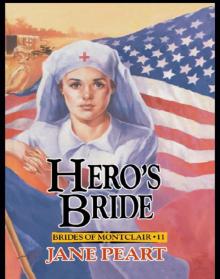 Hero's Bride
Hero's Bride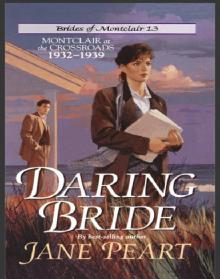 Daring Bride
Daring Bride Runaway Heart
Runaway Heart Promise of the Valley
Promise of the Valley Gallant Bride
Gallant Bride The Pledge, Value
The Pledge, Value Senator's Bride
Senator's Bride Valiant Bride
Valiant Bride Shadow Bride
Shadow Bride Destiny's Bride
Destiny's Bride A Tangled Web
A Tangled Web Folly's Bride
Folly's Bride The Promise
The Promise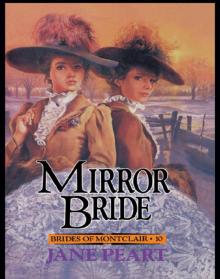 Mirror Bride
Mirror Bride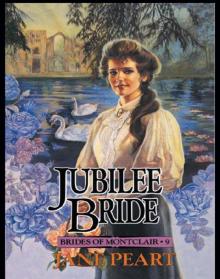 Jubilee Bride
Jubilee Bride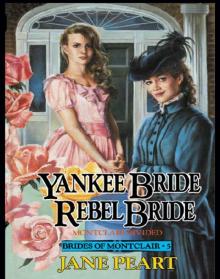 Yankee Bride / Rebel Bride
Yankee Bride / Rebel Bride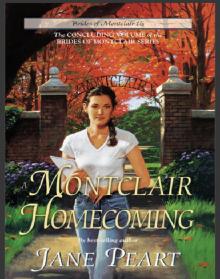 A Montclair Homecoming
A Montclair Homecoming Fortune's Bride
Fortune's Bride Undaunted Spirit
Undaunted Spirit Love Takes Flight
Love Takes Flight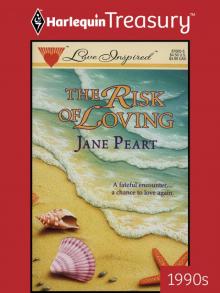 The Risk of Loving
The Risk of Loving The Pattern
The Pattern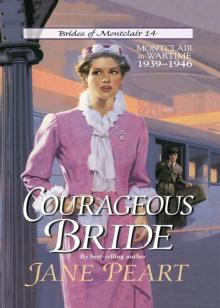 Courageous Bride
Courageous Bride